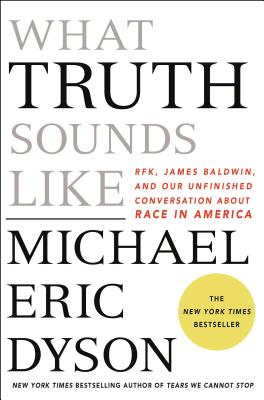What Truth Sounds Like: Robert F. Kennedy, James Baldwin, and Our Unfinished Conversation about Race in America

What Truth Sounds Like: Robert F. Kennedy, James Baldwin, and Our Unfinished Conversation about Race in America
Named a 2018 Notable Work of Nonfiction by The Washington Post NOW A NEW YORK TIMES BESTSELLER - Winner, The 2018 Southern Book Prize
NAMED A BEST/MOST ANTICIPATED BOOK OF 2018 BY: Chicago Tribune - Time - Publisher's Weekly A stunning follow up to New York Times bestseller Tears We Cannot Stop The Washington Post: Passionately written.
Chris Matthews, MSNBC: A beautifully written book.
Shaun King: "I kid you not-I think it's the most important book I've read all year..." Harry Belafonte: "Dyson has finally written the book I always wanted to read...a tour de force." Joy-Ann Reid: A work of searing prose and seminal brilliance... Dyson takes that once in a lifetime conversation between black excellence and pain and the white heroic narrative, and drives it right into the heart of our current politics and culture, leaving the reader reeling and reckoning. Robin D. G. Kelley: "Dyson masterfully refracts our present racial conflagration... he reminds us that Black artists and intellectuals bear an awesome responsibility to speak truth to power. President Barack Obama: Everybody who speaks after Michael Eric Dyson pales in comparison." In 2015 BLM activist Julius Jones confronted Presidential candidate Hillary Clinton with an urgent query: "What in your heart has changed that's going to change the direction of this country?" "I don't believe you just change hearts," she protested. "I believe you change laws." The fraught conflict between conscience and politics - between morality and power - in addressing race hardly began with Clinton. An electrifying and traumatic encounter in the sixties crystallized these furious disputes. In 1963 Attorney General Robert Kennedy sought out James Baldwin to explain the rage that threatened to engulf black America. Baldwin brought along some friends, including playwright Lorraine Hansberry, psychologist Kenneth Clark, and a valiant activist, Jerome Smith. It was Smith's relentless, unfiltered fury that set Kennedy on his heels, reducing him to sullen silence. Kennedy walked away from the nearly three-hour meeting angry - that the black folk assembled didn't understand politics, and that they weren't as easy to talk to as Martin Luther King. But especially that they were more interested in witness than policy. But Kennedy's anger quickly gave way to empathy, especially for Smith. "I guess if I were in his shoes...I might feel differently about this country." Kennedy set about changing policy - the meeting h
PRP: 179.93 Lei
Acesta este Prețul Recomandat de Producător. Prețul de vânzare al produsului este afișat mai jos.
143.94Lei
143.94Lei
179.93 LeiLivrare in 2-4 saptamani
Descrierea produsului
Named a 2018 Notable Work of Nonfiction by The Washington Post NOW A NEW YORK TIMES BESTSELLER - Winner, The 2018 Southern Book Prize
NAMED A BEST/MOST ANTICIPATED BOOK OF 2018 BY: Chicago Tribune - Time - Publisher's Weekly A stunning follow up to New York Times bestseller Tears We Cannot Stop The Washington Post: Passionately written.
Chris Matthews, MSNBC: A beautifully written book.
Shaun King: "I kid you not-I think it's the most important book I've read all year..." Harry Belafonte: "Dyson has finally written the book I always wanted to read...a tour de force." Joy-Ann Reid: A work of searing prose and seminal brilliance... Dyson takes that once in a lifetime conversation between black excellence and pain and the white heroic narrative, and drives it right into the heart of our current politics and culture, leaving the reader reeling and reckoning. Robin D. G. Kelley: "Dyson masterfully refracts our present racial conflagration... he reminds us that Black artists and intellectuals bear an awesome responsibility to speak truth to power. President Barack Obama: Everybody who speaks after Michael Eric Dyson pales in comparison." In 2015 BLM activist Julius Jones confronted Presidential candidate Hillary Clinton with an urgent query: "What in your heart has changed that's going to change the direction of this country?" "I don't believe you just change hearts," she protested. "I believe you change laws." The fraught conflict between conscience and politics - between morality and power - in addressing race hardly began with Clinton. An electrifying and traumatic encounter in the sixties crystallized these furious disputes. In 1963 Attorney General Robert Kennedy sought out James Baldwin to explain the rage that threatened to engulf black America. Baldwin brought along some friends, including playwright Lorraine Hansberry, psychologist Kenneth Clark, and a valiant activist, Jerome Smith. It was Smith's relentless, unfiltered fury that set Kennedy on his heels, reducing him to sullen silence. Kennedy walked away from the nearly three-hour meeting angry - that the black folk assembled didn't understand politics, and that they weren't as easy to talk to as Martin Luther King. But especially that they were more interested in witness than policy. But Kennedy's anger quickly gave way to empathy, especially for Smith. "I guess if I were in his shoes...I might feel differently about this country." Kennedy set about changing policy - the meeting h
Detaliile produsului










